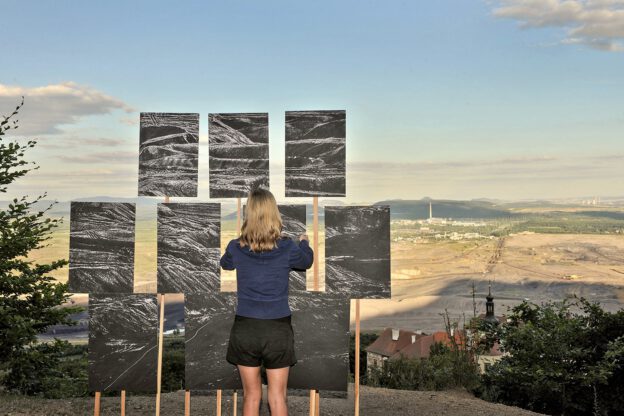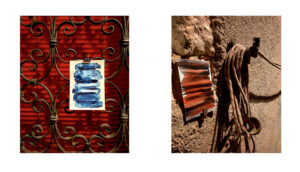Elizabeth Gerdeman is presciently aware of the growing conflict between humanity and nature. Whilst in many cases this is not a conscious, aggressive conflict, humanity’s tendency to scrawl its signature across the Earth’s face is becoming more and more pronounced. And it is accompanied by more and more consequences. This signature not only comes in the form of well-publicised, modern ecological issues, but all traces of humanity. Throughout history the delicate equilibrium between us and nature has been in a state of constant recalibration.
Elizabeth’s art is always aware of this. Environment, in all its forms and definitions, is seemingly ever-present in her work. The American born artist, considers landscape not as a passive scene, but as something deeply interactive. For Elizabeth, landscape is a text or an interface to be studied, read, dissected and discussed. It is as full of political, sociological, and cultural truths and ideologies as is any man-made environment. Aside from depicting landscapes and environments in her work, Elizabeth attempts to question human interaction with these concepts.
Elizabeth’s interactive landscapes
Interrogating our industrial and commercial impulses, Elizabeth questions our evident attraction to nature. She points out that we invent colours and patterns and then call them things like “Iceberg Blue” and “Glacier Lake”. We are happy to appropriate nature’s cosmetic aspects, whilst systematically destroying the environments that inspire us so much. Urban and industrial versus nature is not the only conflict in our approach to our environment. A larger, more complex conflict is the one that rages inside us.
Images supplied by artist. Credits as listed.
Elizabeth is truly a multimedia artist, working with paintings, collage, video and installation art to create a truly holistic range of works. Elizabeth’s approach to the world is well-encapsulated by her Floating or Sinking series. These paintings depict Venice: surely the paragon of humanity’s conflict with nature. Built entirely on land wrestled from the sea, this city is described by Elizabeth as a “double-faced Medusa”. It is a city built on contradictions, as well as reclaimed land. It is a city that throbs with crowds, but has very few permanent residents. Venice is a triumph of impracticality, a statement of human primacy over nature. Venice is a city of tourism and reality, land and water, floating and sinking.
Waterlogged
Part II of the series deals with the recent, devastating floods she witnessed first hand. Elizabeth saw the city, which usually sits so proudly on top of the waves, descend into panic. She was struck by the delicacy of our separation from nature, a “fictive boundary”. She watched furniture and possessions float away and residents desperately try to waterproof their houses. Elizabeth captured this tragedy in her watercolour paintings. Deliberately choosing this medium to reflect the subject matter, Elizabeth’s paintings are full of blurred boundaries, dark, stormy blues which swell and seep into other colours. Soaking the surface, her watercolours reflect Venice’s precarious relationship with the sea.
Elizabeth Gerdeman, Floating or Sinking II, photo of watercolor on paper installed in Venice
Another consequence of our encroaching on nature has been the COVID-19 pandemic. Elizabeth, who also lecturers at the Academy of Fine Art (HGB) in Leipzig, is conscious of both the restrictions and opportunities this unique situation has thrust upon the world of art. Elizabeth is particularly interested in how it will affect our relationship with interior and exterior environments. She notes that, forced into lockdown, we are compelled to view things from the inside, looking out.
Rethinking interior vs exterior
Perhaps this can afford us all the opportunity to widen our gaze, take a step back from our realities. Elizabeth sees this tumultuous year as a chance to rethink “the relationship between humans and the environment”, as well as how we consume culture. Perhaps this also means new environments for art. Virtual methods of viewing art will become a more regular aspect of our lives. This brings with it the chance to broaden out art to new audiences, a move Elizabeth embraces. Whatever the future holds, Elizabeth Gerdeman’s art and writing will continue to question our relationship with the planet we inhabit.
written by Ben Gosling
See more of Elizabeth Gerdeman on her website and follow her on instagram.
Creative Pathfinders interview
Tue 26 January 2PM-3PM EST (8PM-9PM CET)
Watch Elizabeth interviewed by Merijn van der Heijden, director of Urban Arts Space and Hopkins Hall Gallery
PILOTENKUECHE is pleased to have Elizabeth on our expert panel giving a session on writing for our Online Residency Program.








